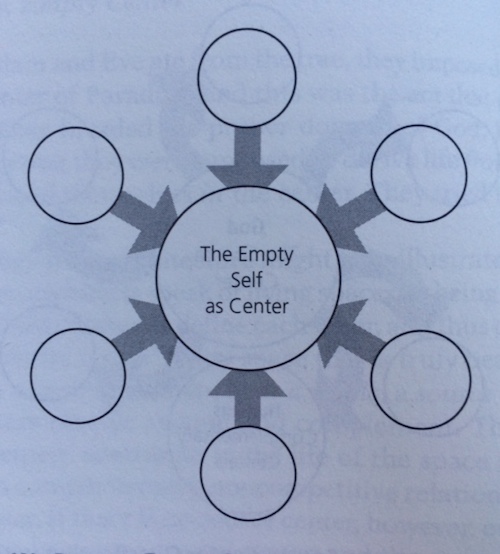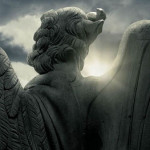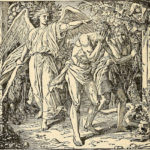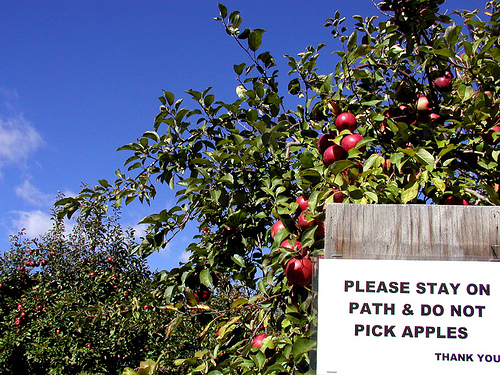We run our website the way we wished the whole internet worked: we provide high quality original content with no ads. We are funded solely by your direct support. Please consider supporting this project.
What Went Wrong in the Garden of Eden?
When Adam and Eve ate from the tree, they imposed their will into the center of Paradise, and this was the act that destroyed Paradise. They invaded the proper domain of God. Instead of recognizing that they were supposed to derive life from the center, they placed themselves in the center. They tried to become “like God.”
The beauty of creation depends on the integrity of the distinction between the complementary centers and the source of the center. The “No Trespassing” sign placed at the center of the garden represents the warning to preserve this boundary and thus the order, beauty, and life of creation. Everything depends on humans remaining humans and not trying to be God—not trying to be their own source center.

Adam and Eve violated this boundary. They thrust themselves into the center of the garden to try to make themselves “wise like God.” They tried to design their own space, as it were, with themselves as the center. And we do the same. We try to make creation—and God—revolve around us. Instead of remaining content being complementary centers, we try to make everything complement us. We attempt to use things and people to derive our worth, meet our needs and expectations, or improve our lives in some way. And we “know good and evil” in the process, for we invariably judge things as “good” or “evil” on the basis of how well they play the idolatrous role we assign them.
Living as the source center means living as judge. But we were not created to function as the source center. We were created to function as complementary centers. We have no life in ourselves to dispense to other centers. Consequently, our center is not one of fullness but of emptiness. Without God as our center, we are not a source of life but a vacuum that sucks life. We can’t radiate life in other centers; we can only try to draw life from them. The world and God revolve around us, and we become a virtual black hole, as depicted by the diagram below.

It is out of the depravity of this black hole that we function as a center, playing God, judging good and evil.
This is life “in the flesh” or life “in Adam.” It is life lived under the serpent’s lie and thus life lived as though we were the center. This way of life is diametrically opposed to God, for it makes it impossible for the fullness of God’s love to flow into us and through us.
In this fallen way of life, people and things have worth only to the extent that they fill us. Instead of ascribing unsurpassable worth to others because the Creator does, we ascribe limited worth to people depending on our judgment of them. Do these people love me? Do they please me? Do they benefit me? Do they affirm me? Do they agree with my opinions? We are the ones who declare that someone or something is good or evil, for we have set ourselves up as the center around which everything revolves and, therefore, the standard against which everything is measured.
—Adapted from Repenting of Religion, pages 68-71
Category: General
Tags: Garden of Eden, Idolatry, Judgment, Repenting of Religion, Sin, Temptation
Topics: Creation Care
Related Reading

The Patriot’s Bible — Really?
Have you ever seen the Saturday Night Live skit entitled “Really? With Seth and Amy”? Sometimes it’s pretty funny. I was thinking that perhaps the best way to get through my critique of The American Patriot’s Bible (henceforth Patriot’s Bible) would be to give a “Really?” type report on it. I want to preface my…

Podcast: Am I Being Tested By God? Or Am I Being Attacked By Satan?
Greg ponders whether or not the SOURCE of testing matter, and offers wisdom for dealing with testing. http://traffic.libsyn.com/askgregboyd/Episode_0301.mp3

To My Offender
We’re happy to introduce you today to Brandon Andress. He is the author of AND THEN THE END WILL COME! and UNEARTHED: How Discovering the Kingdom of God Will Transform the Church and Change the World. He has served as an elder and teaching pastor at The Living Room Church in Columbus, Indiana. Brandon writes…

6 Things the Church Fathers Can Teach Us about Spiritual Warfare
Image by Christina Saint Marche via Flickr Unlike our thinking today about the source of good and evil in the world, the early church fathers, including Irenaus, Athenagorus, Origen, and others before Augustine, possessed a warfare worldview. Here are 6 ideas that are common in their writings: The Reality of the “World-in-Between” The church fathers assumed…

The Challenge of Malala to the Church
http://youtu.be/f506lCk6Tos I don’t know if you’ve seen this, but it’s Malala Yousafzai appearing on Jon Stewart’s The Daily Show. At the age of 14 Malala was shot in the face at point blank range by the Taliban while riding to school on a bus, all because she wouldn’t stop speaking up for the right of…

The Flesh: 4 Things to Know
The New Testament contrasts “life in the Spirit” with “life in the flesh” (see Gal 5:16-20). In some translations, the word for “flesh” (sarx, in the Greek) is translated as “sinful nature” as if one’s identity, or who we are in our essential being, is sinful. However, such a view of the flesh denies that…

